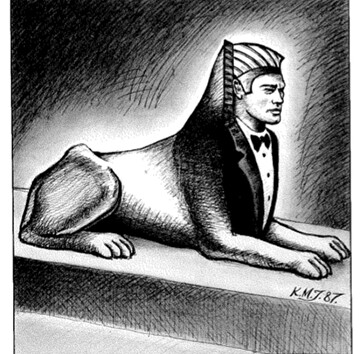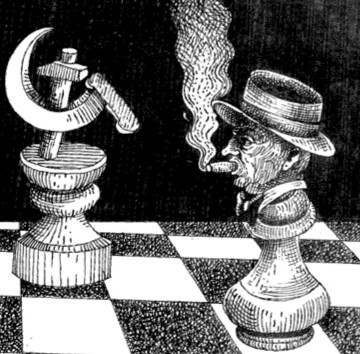Although it is widely believed that persons who oppose big government are sympathetic to large businesses and have no compassion for the little guy, no such logical connection exists. Democratic governments, as the author points out, respond to the interests of large, well-organized, and well-financed groups. Big business learned to induce governments “to further their...
Category: Reviews
Invasion of the Child-Snatchers
Who has more rights in the American judicial system—a man accused of murder or one accused of child abuse? The accused murderer is guaranteed the good old English right of trial by jury; he’s presumed innocent until proved guilty. He may even demand a court-appointed lawyer (if he can’t afford his own). The accused child...
A Second Opinion
This profoundly conservative book forms a powerful personal argument against the liberal dogma that “modernity” destroys religion. Much of the left, militantly secular as it is, has attempted to make it “self-evident” that no reasonable person can believe in God, let alone in a particular religious tradition and its revelation. “We all know” that religion...
Unraveling the Remnant
“Whatever the road to power, that is the road which will be trod.” —Edmund Burke For years, or at least for that stretch of time between the heady days of Theodore Roosevelt and the hapless days of Jimmy Carter, something called the Eastern establishment benevolently ruled over America. For years, or at least between the...
Institutionalized Music
Samuel Lipman’s pieces on music came out originally in magazines, chiefly in Commentary and The New Criterion. The obvious question arises. Are enough of these essays of sufficient interest and importance to justify republication? The answer is happily yes. Lipman’s candor, taste, and intelligence as well as the wide range of his musical interests make...
Fine China
“In this age of decadence people love antiques and willingly submit to deception.” —Cheng Hsieh, 18th-century Chinese poet and painter Anyone who fondly supposes that the Chinese Communists are the “good” Communists should read this exciting, powerful book by the Belgian sinologist Pierre Ryekmans, writing under his nom de plume, Simon Leys. As far back...
Love and Death
Perhaps it is inevitable that Life and Fate by Vasily Grossman has been compared to Leo Tolstoy’s War and Peace. There are obvious parallels. Tolstoy wrote a lengthy book on the unsuccessful Napoleonic invasion of Russia, while Grossman wrote a lengthy book on the unsuccessful Nazi invasion of the Soviet Union. Both works also deal...
Past and Present
“The handwriting on the wall may be a forgery.” —Ralph Hodgson A steady flow of scholarly works on the intellectual roots of modern conservatism has appeared since the 1950’s. Russell Kirk’s The Conservative Mind was and remains the best and the best-known of such books, but similar studies by Peter Viereck, Clinton Rossiter, and others...
The Triumph of Time
The second law of thermodynamics poses a problem for evolutionary biologists. While it seems to predict increasing disorder over time, the record of evolution suggests ever-increasing order and higher levels of organization. The common solution to the paradox was to look for a balance between organic systems and their environment. Perhaps there was, as Schrodinger...
Old Babbitts Die Hard
“Believe me, it’s the fellow with four to ten thousand a year, say, and an automobile and a nice little family in a bungalow on the edge of town, that makes the wheels of progress go round.” —George F. Babbitt The most prominent buildings of a civilization speak eloquently of what it esteems. The great...
Players of the Game
” . . . to chase the rolling circle’s speed Or urge the Hying ball . . . “ —Thomas Gray The Puritans, who once condemned stool ball, quoits, and bowls, would stand in stern judgment of the millions of Americans who every Sunday choose a ball game over church attendance. Yet game-playing did begin...
Character in Acting
To 18th-century Britons and Americans who devoted any serious thought to the subject of human nature—and a great many did—the conventional starting point was the theory of the passions, or drives for self-gratification. Rousseau to the contrary, man was not naturally good but was ruled by his passions, both primary (fear, hunger, lust) and secondary...
Prairie Dog
Fairbanks has an interesting hypothesis: that early prairie women loved the plains and their adventurous lives here as much as pioneer men did. I have never believed in the myth that every pioneer woman was long-suffering, silently hating the prairie and the man who brought her here. I was pleased to think that I’d found...
Catholic Church USA
Three histories of the Catholic Church in the United States have become available within a two-year period—books by James Hennesey, S.J., Martin Marty, and now Jay P. Dolan, the bitterest of the three. More remarkable than the mere number are the significant likenesses. Are they the result of the zeitgeist or an attempt to shape...
Security Safari
“Be sober, be vigilant; because your adversary, the Devil, as a roaring lion, walketh about, seeking whom he may devour.” —1 Peter, V, 8 The scene is so identifiable that any American—in fact, almost anyone anywhere in the world—immediately recognizes it: a dun-baked, dusty street between rows of ramshackle, weather-beaten, false-fronted buildings. To the pounding...
Babbitt in the Eighties
Six of this book’s 10 essays were presented at a conference commemorating the 50th anniversary of Irving Babbitt’s death. Held in Washington, DC, at The Catholic University of America in November 1983, the conference brought together scholars of various disciplines to address the general subject of “Irving Babbitt: Fifty Years Later.” Although some people might...
Prurient Puritans
These apparently very different books—a cultural history and research on American sexual mores—actually address the same issue: the attempt to reconcile morality and the sexual impulse. A typically puritanical endeavor, because the puritan, with his eternal bad conscience about things that may not please God, that is sin, goes through mental, moral, and behavioral contortion...
Out of the Closet, Into the Morgue
Homosexual activists will not like this book. For if ever there were an empirical refutation to the “gay rights” agenda. Gene Antonio has written it. In convincing (sometimes nauseating) detail, Antonio explains why the homosexual movement has provided the ideal conduit for one of the most lethal diseases ever to affect mankind. Yet homosexuals and...
A Strange Career
C. Vann Woodward, Sterling Professor of History Emeritus at Yale University and a contributing editor to The New Republic, is the leading liberal historian of the South. For three decades his encyclopedic knowledge and detailed historical investigations have produced works that have set the pattern for subsequent historians. Woodward accepts the title “liberal,” if somewhat...
Talk to Me
The last 20 years have seen the proliferation of a machine that stores, organizes, and retrieves information: the computer. It can perform repetitive tasks without error or fatigue, analyze problems too complex for the human brain, and collate great quantities of information. The power of the computer, however, has its drawbacks—among other things, it allows...
On the Road Again
“We would rather run ourselves down than not to speak of ourselves at all.” —La Rochefoucauld It is a signal of things to come that Gerard Thomas Straub opens his book Salvation for Sale: An Insider’s View of Pat Robertson’s Ministry with a list of quotations that begins with Miguel de Unamuno and winds up...
Martyrs Inc.
“When I must define my own views,” writes Milovan Djilas in his latest book, Of Prisons and Ideas, “I identify them as ‘democratic socialist.'” For those who find this oxymoronic, Djilas’ whole book may seem like an exercise in contortion. True to his earlier autobiographical works, Djilas clings to the purity and the intensity of...
Empire Strikes Back
” . . . To sit in darkness here hatching vain empires.” —Milton During his discussion of the overthrow of feudalism by the bourgeoisie in his classic Capitalism, Socialism and Democracy, Joseph Schumpeter asked whether “in the end such complete emancipation was good for the bourgeois and his world.” He concluded that it had not...
Republican Vices
For some 73 years, since November 1914, The New Republic has been the self-constructed soapbox for the best ideas and insights proffered by the liberal intellectual community (which may explain why the magazine is always so thin). Some of the most important names in American liberalism have graced the magazine’s pages as it has laid...
Harvard Goes South
“Ce sonts les modernes qui font des progies. Nous sommes betes une fois pour toutes.” —Péguy This curious big book is an amalgam of left-wing scholarship and commercial panache. On the one hand, the author, a Harvard Ph.D. in American Civilization and a missionary to South Carolina, seems to have enjoyed extended foundation support during...
A Month of Woes
“Evening must usher night, night urge the morrow, month follow month with woe, and year wake year to sorrow.” —Shelley The Book-of-the-Month Club, now in its 60th year, is an American success story in the grand manner—its financial success demonstrated by listing on the New York Stock Exchange and later acquisition by Time, Inc., its...
Reenchanting the World
“Do not seek to become a god.” —Pindar Once we begin to see that we are all God, that we all have the attributes of God, then I think the whole purpose of human life is to reown the Godlikeness within us; the perfect love, the perfect wisdom, the perfect understanding, the perfect intelligence, and...
Dakota Days
It was their ordinariness that made them matter. . . . Individual life was by its very nature a tragedy; it came to an end; for all of us it was going to be a short way to that grave. But the ordinary life of a society was a comedy that just kept going on....
U.S., A Captive Nation
Benjamin Ginsberg’s The Captive Public is a breath of fresh cynicism. With insight and illustration, it argues that mass opinion and majority will are not necessarily the nemesis of Big Brother. In modern society, Ginsberg argues, the Orwellian state can adapt and even mold them for its purposes. Nor is this a new development. Ginsberg...
Mistress of Deceit
Oxford University Press advertises its Past Master series (of which this book is one) as being “a noble encyclopaedia of the history of ideas” in which “lucid and authoritative” modern critics introduce us to the best of what has been thought and written. Oxford seems to have dropped a brick on this one. Lucid? Here...
In the Beginning
If it is true that the Constitution of the United States is to be construed by its intent rather than by mysterious and highly malleable forces of “evolution,” then recovery of the intellectual context out of which it arose is of the highest priority. However, the discovery of intent is primarily a question of historical...
A Fool in the Forest
“Shall they hoist me up and show me to the shouting varletry of censuring Rome?” —William Shakespeare The true facts of the case will lie hidden in time forever. For our purpose here, we can accept the official version; that the emperor Augustus in the year 8 A.D. exiled the poet Ovid to Tomis, a...
Doctors of Education?
A recent issue of Forbes contained the truly wonderful news that a corporation is now selling a video encyclopedia of the 20th century. This is sure to be a hot item in the “education technology” business. Today’s students, who dislike ordinary encyclopedias because they must be read, can now “tap into the visual side of...
Best Western Civ
“Sic omnia fatis in peius ruere ac retro sublapsa referre.” (All mortal things are subject to decay.) —Vergil This is a handsome book in all pertinent respects. It is stately of subject, nicely written, well-edited, and eye-winning in cover—especially the jacket. Roberts, a well-known British historian and university chancellor, has written the book, we are...
What Is the Good?
“We know the good but do not practice it.” —Euripides These two unusually interesting collections of studies are in sharp contrast to the contemporary Anglo-Saxon style of academic scholarship. Both authors take seriously the pertinence of classical thought to contemporary discussions of the good. Strauss is even less professorial than Gadamer in that he takes...
The Great Spirit of Form
Malcolm Bradbury describes Peter Handke as “unmistakably one of the best writers we have in that selfdiscovering tendency in contemporary writing we have chosen to call postmodernism.” And, true enough, Handke is eminently skillful at what he sets out to do. Poet and playwright as well as novelist, he is concerned above all with exploring...
God’s Fool
Auberon Waugh’s finely sharpened pen cuts through the mist of illusions that prevent Americans from seeing Britain as it is. In these articles from the Spectator, he exposes a society nearly gone mad. Royalty and commoner, young and old, liberal and conservative are routed by Waugh’s scathing satire. He writes of the follies of socialism...
Back to Barbarism
Much of the bioregional vision should appeal to conservative sentiments. As the pitiful remnant of America’s agrarian culture again falls victim to drought and depression, the bioregionalists call for a return to the land, a reconstruction of self-sufficient farm life, and a reverence toward the soil as the organic bond of human generations. As Ortega...
Peri Bathous
From front cover to back, the total “package” of George Garrett’s new novel, Poison Pen, is a shuck and a con. No fictional work in recent memory is so elaborate a satire, and a reader would have to go back to the 18th-century Augustans to find its equal. To begin with, the jacket’s slick black...
Senator From Nebraska
George Nash, the historian of post-World War II American conservatism, in a recent speech at Hillsdale College in Michigan called for a conservatism which would attempt to change the world as well as to understand it—a conservatism of politics as well as of scholarship. Conservatism, Nash declared, “must succeed in the arena of polities, not...
The Padre From Chicago
“He canonizes himself a Saint in his own lifetime.” —Samuel Butler Exhibitionism is a sin yet to be legitimized in Father Andrew Greeley’s ongoing excursion into soft porn (or those novels which he euphemistically christens his “comedies of grace”). But Greeley, the exhibitionist, is on full display in his venture into autobiography (or this book...
School Daze
“A motive fair to Learning’s imps he gave. . . . “ —William Shenstone American education has never been in very good shape, so criticizing it now would be a redundancy, except for the fact that we are facing an increasing teacher shortage across the curricula and across all grade levels which shows no signs...
“I Keek It, I Vin It”
Two decades ago, the general managers of professional football teams discovered that the highly specialized jobs of placekicking could be done by sometime soccer players, most of them born and raised abroad. The placekicker, we remember, is often called upon to deliver a field goal whose three points, especially in the game’s concluding moments, can...
Put Out No Flags
A former literary editor of The Spectator in London and currently touted as the new novelist of manners, A.N. Wilson was the author several seasons ago of a creditable biography of Hilaire Belloc. But the novels Wise Virgin (1983), Scandal (1984), and Gentlemen in England, just published in this country, remain chiefly responsible for his...
A Spymaster Defects
As a member of the last generation of English middle-class boys brought up on great expectations of prosperity, glamour, and power, John Le Carré first became famous in America when his obsession with the failed promise of his own society supplied an analogy for American middle-class readers jaded by the extravagant claims being made for...
An Executive Fights Back
During the well-publicized oil crisis of the I970’s, populists looking for an easy answer to the problem of excruciatingly long lines at gas stations reflexively blamed the big oil companies. These barons of black gold were accused of bilking the public. So widespread was this sentiment that President Carter himself joined the chorus of blame....
Betrayed by Britain
“And hung my head and wept at Britain’s name.” —Samuel Taylor Coleridge If there be monsters, they yawn from within. It is hard not to see justice in the story of an empire, brought low by its unwillingness to defend itself. “This book is in part a penance for unquestioningly accepting the Titoist bias shared...
The Right Kind of Spy
In these two recent spy thrillers, William F. Buckley’s CIA-trained alter ego makes his sixth and seventh appearances in a decade to play a winning hand in the high-stakes intrigue surrounding crucial moments in the Cold War. On a secret mission to Cuba (Project Alligator) aimed at exploring with Che Guevara possibilities for easing tensions...
Entrepreneurs and Bureaucrats
Despite his Viennese birth, Peter Drucker enjoys a reputation as a leading American social analyst, particularly on industrial and economic issues. In Innovation and Entrepreneurship, Drucker interprets U.S. management theory and practice within the framework of the free market economy and the open society, as he seeks to define entrepreneurship as “a craft” essential for...
The Bureaucrat and the Shoe Salesman
“Among the many priests of Jove . . . all passed muster that could hide Their sloth, avarice, and pride.” —Bernard Mandeville Bruno Rizzi’s La Bureaucratisation du Monde, first published in Paris in 1939 and Part I of which is here translated by Adam Westoby into English for the first time, is the obscure work...


